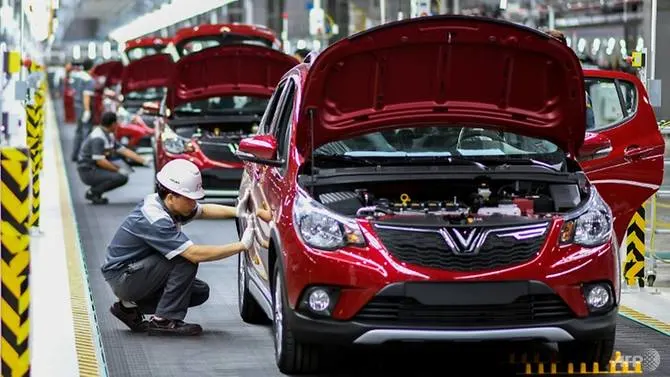Commentary: Vietnam bets big on a homegrown US$17,000 hatchback
30 June, 2019

Earlier this month (Jun 14) a new car rolled off the assembly line and on to the roads of Vietnam.
The VinFast Fadil is a US$17,000 compact hatchback with big ambitions. From its shiny new factory in the northern Vietnamese city of Haiphong, the company behind it is targeting initial production of 250,000 vehicles a year – just a few thousand less than Vietnam’s entire annual car sales for 2018.
Ultimately it plans to increase production to 500,000 annually, as well as pushing out up to 12 other models of cars, SUVs and electric motorbikes in the next two years.
BIG AMBITIONS
The Vietnamese government meanwhile is hoping the project will help turbo-charge Southeast Asia’s fastest-growing economy, spurring growth of a high value-added manufacturing sector.
Efforts of other developing Asian nations to launch their own car marques have seen patchy results at best.
India’s Tata Nano and Malaysia’s Proton, for example, received massive investment but failed to become sustainable businesses. The Nano was abandoned as a failed project last year.
In Vietnam too, an earlier domestic automaker known as Vinaxuki collapsed in 2015 after its poor technology and management failed to find favour with a limited pool of Vietnamese consumers.
However, there is strong reason to believe that VinFast has much better prospects, due to a combination of good timing and corporate backing that has both the vision and the deep pockets to play the long game.
BACKED BY VIETNAM’S BIGGEST CONGLOMERATE
VinFast is a subsidiary of the sprawling Vingroup, Vietnam’s largest private conglomerate that started out making instant noodles, built its name in real estate and has since diversified into retail, education and healthcare among other fields.
Last December, as part of an expansion into the tech sector, it launched its own smartphone venture.
The conglomerate is owned by Vietnam’s richest man – the country’s first billionaire – and has a reputation for quality products and services which will be crucial in attracting highly brand-conscious Vietnamese.
For its car-making venture Vingroup has reportedly invested US$3 billion in equipping its assembly plant with the latest automation, hired experienced top managerial talent, and is collaborating with well-known partners such as BMW and parts-maker Bosch.
The Fadil car, for example, is built on the chassis of a hatchback made by Opel, the German subsidiary of the French auto-giant PSA.
BUILDING REPUTATION
But what makes this the right time for a new car brand to hit the market?
With the motor industry worldwide shifting towards electric and even self-driving cars, it could be asked whether launching a traditional gasoline-fuelled car venture is a strategically wise move.
All indications are that, at a global level, these new technologies seem to be the future of car manufacturing.
However, it’s important to look at the realities of the Vietnam’s physical infrastructure which is a long way from being able to support either electric vehicles or driverless cars.
This presents plenty of scope for VinFast to build its strength, capabilities and reputation domestically before in the longer term developing more advanced products and venturing overseas.
More importantly though the launch of the Fadil comes at a time when Vietnam’s nationwide per capita GDP is rapidly approaching US$3,000.
This is commonly seen as a watershed point at which economists say spending on cars and other big ticket consumables starts to ramp up significantly. Sales for new cars in Vietnam picked up almost 20 per cent more in the first five months of this year, compared to the same period in 2018.
To date, Vietnamese consumers with money to spend have tended to veer towards familiar and prestigious foreign brands when making high value purchases. But with expansion of the country’s middle class picking up pace, a growing body of potential car-buyers is emerging for whom the high prices of imported brands remain out of reach.
It’s these first time car owners in particular that VinFast hopes to win over.
To sweeten the deal, the company has said it will be subsidising car sales for up to five years, forgoing profit as it builds up market share. It is, says the company’s chairwoman, part of the long-term game plan.
On top of this, it is also hoping that patriotism will help drive sales, a factor that is especially ingrained in Vietnam. With this in mind VinFast’s marketing campaigns have been emphasising the national pride element of supporting a Vietnamese-made car.
